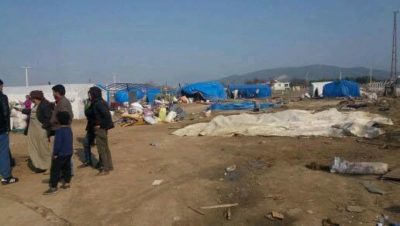
As of February 8th, refugees living in tents in the Torbalı and Bayındır districts of İzmir are being evacuated in accordance with district governorate decisions through the intervention of its gendarmerie State paramilitary force. The tent areas are being removed. Thousands of refugees, who left their countries because of the civil war in Syria, have been struggling to survive as seasonal agricultural workers and living in the tent camps, constructed through their own efforts, in rural areas of İzmir.
Since Wednesday, many tent areas have been removed by gendarmerie without reason. Some tent areas were given until Monday to evacuate. Refugees whose assigned residence city is not İzmir have been expelled and people are being told they are expected to rent homes. However, for the majority of the refugees who work for very low wages it is not possible to earn enough money to move into a house.
In return for originally directing people to the tent areas and finding people jobs, “dayıbaşı” (the bosses of the areas) deduct money from refugees’ wages, pay irregularly or do not pay people at all. Since the agricultural workers need to live close to their working areas and don’t know the local language [Turkish], they are forced to accept the dayıbaşı system. Thus, being evacuated from their tents means taking away their means to an income.
What this means is that refugees who already left everything they had in Syria will, for a long time, now be unable to earn an income — demand for seasonal workers decreases in winter. They have survived through the cold weather thanks to tents, food, firing, diapers and hygiene products provided by a limited number of volunteers and CSO’s. The tent areas, which lack toilets, showers, clean water and have been covered in mud from rainfall, are being ignored by the authorities.
These conditions affect children the most. Children are exposed to illnesses and developmental disabilities as a result of poor nutrition and health conditions. Hospitals deny treatment to refugees without documents. Even the death of baby Noaf, of pneumonia, after being refused hospital treatment did not impact government policy; which makes it particularly hard for refugees to get registered. And there are lots of children suffering from pneumonia in the camps. The threat of forced displacement by the gendarmerie further deepens the trauma of children, initially caused by the civil war and subsequent poor living conditions.
Last May, before the harvest, these tent areas providing a living space for nearly 2,000 people were removed by the district governorate. It is thought-provoking that the same action is now being taken just before seed-time, when the demand for seasonal workers increases. All this despite three years of speculation that the district governorate and municipality had plans to move people from the tent areas to one central place; to improve the living conditions of agricultural worker refugees.
